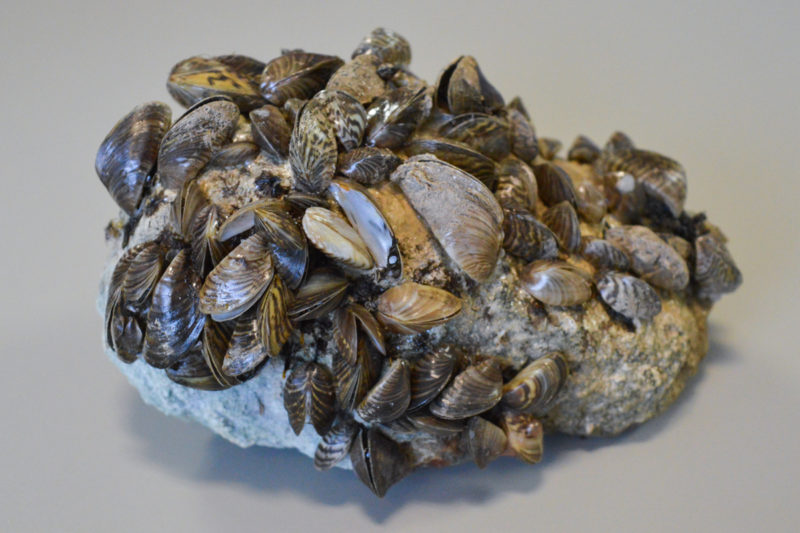October Floods Might Slow Spread of Invasive Zebra Mussel
By Stephen Cabler
Reporting Texas

Zebra mussels can be easily identified by the zebra-like stripes on their shells. Stephen Cabler/Reporting Texas.
Near-record flooding along the Llano River in October might slow, at least temporarily, the spread of the zebra mussel downstream in the Colorado River basin, biologists say.
The zebra mussel is an invasive species that has inflicted billions of dollars in damages on waterways and man-made structures exposed to water infested with the mussel. According to a report released by the Aquatic Nuisance Species Task Force, between 1993 and 1999 the Great Lakes-area power industry suffered $3.1 billion in damages, and the overall impact to businesses, communities and industries reached $5 billion.
According to the Lower Colorado River Authority, widespread rain in the Colorado River basin reached up to 30 inches in places in October. As the floodwater moved downstream, its increased speed and turbidity, or cloudiness, likely killed young zebra mussels.
“Turbulence tends to crack open their shells. They’re very small and fragile at that stage,” Monica McGarrity, the aquatic invasive species team leader at Texas Parks and Wildlife Department, said.
Zebra mussels are native to eastern Europe and western Russia and were discovered in the Great Lakes in 1988. They were brought to the United States in the bilge water of cargo ships traveling from the Black Sea and spread rapidly though the Great Lakes.
The mussels usually grow to about one inch long. They live for two to five years and can reproduce as early as their second year; a female zebra mussel can release up to one million eggs per year. This allows the population to grow at an alarming rate.
Zebra mussels are sharp and cause physical harm when touched. They tend to gather on boats and clog engines, causing damage.
The mussels’ huge numbers and constant feeding takes a lot of food, and their main food source is plankton, which also feeds native mussels and small fish. The shrinking population of small fish in turn reduces the food source for mid-size fish, and the damage continues up the food chain. Eventually game fishing suffers.
As zebra mussels take over, their feeding filters enormous quantities of water, and it becomes clearer. When the water gets too clear, underwater plant life gets too much sunlight, damaging habitats for fish and other aquatic animals.
The mussels also can clog water intake pipes, causing problems for utilities that depend on water from infested lakes.
“For Austin Water [the main issue] is with the fouling of their infrastructure,” Brent Bellinger, environmental scientist at the Austin Watershed Protection Department, said.
Water utility managers worry that the zebra mussel will move up the intake pipes and spread inside treatment plants, causing damage to equipment and costing the water companies time and money to remove them.
The flooding seen in October brought massive amounts of water flowing at incredible speeds that caused devastation to anything in a path.
“This was a historic flood. As the Llano River reached record levels, the flood flow into the Highland Lakes system on Oct. 16 was unprecedented at more than 300,000 cubic feet per second,” LCRA spokeswoman Clara Tuma said. “To put that in perspective, the amount of water rushing to the Highland Lakes would fill the Astrodome every two minutes and 20 seconds.”
When the water rises, aquatic plants and animals can move into the new spaces. When it recedes, the plants and animals risk being stranded in areas above water. At Lake Ray Roberts, located north of Dallas in Pilot Point, zebra mussels took over the park after a flood in 2015.
“The water came up so high that they were setting on picnic tables and pavilions and every hard structure within the park,” McGarrity said.
While helpful immediately after the event, the flooding may not help much with the long-term goal of managing the population.
“The thought is that, at least in the short term, the high turbidity and high flows” inflicted “a bit of hit on their population,” Bellinger said. “My guess is it will be short lived.”
On the other hand, the floodwaters probably pushed the zebra mussel into new habitat downstream faster than if they had moved on regular currents, McGarrity said.
The Lower Colorado River Association and Texas Parks and Wildlife Department have teamed up to create the Clean, Drain, Dry campaign to remind people they can help slow the spread of zebra mussels. While there is no way to stop the invasion, it can be slowed down, according to Ryan McGillicuddy, a conservation ecologist with the Texas Parks and Wildlife Department.
“There still is a role for boaters to play in protecting upstream resources in cleaning, draining, drying their boat to prevent the transfer of those aquatic invasive species,” he said.